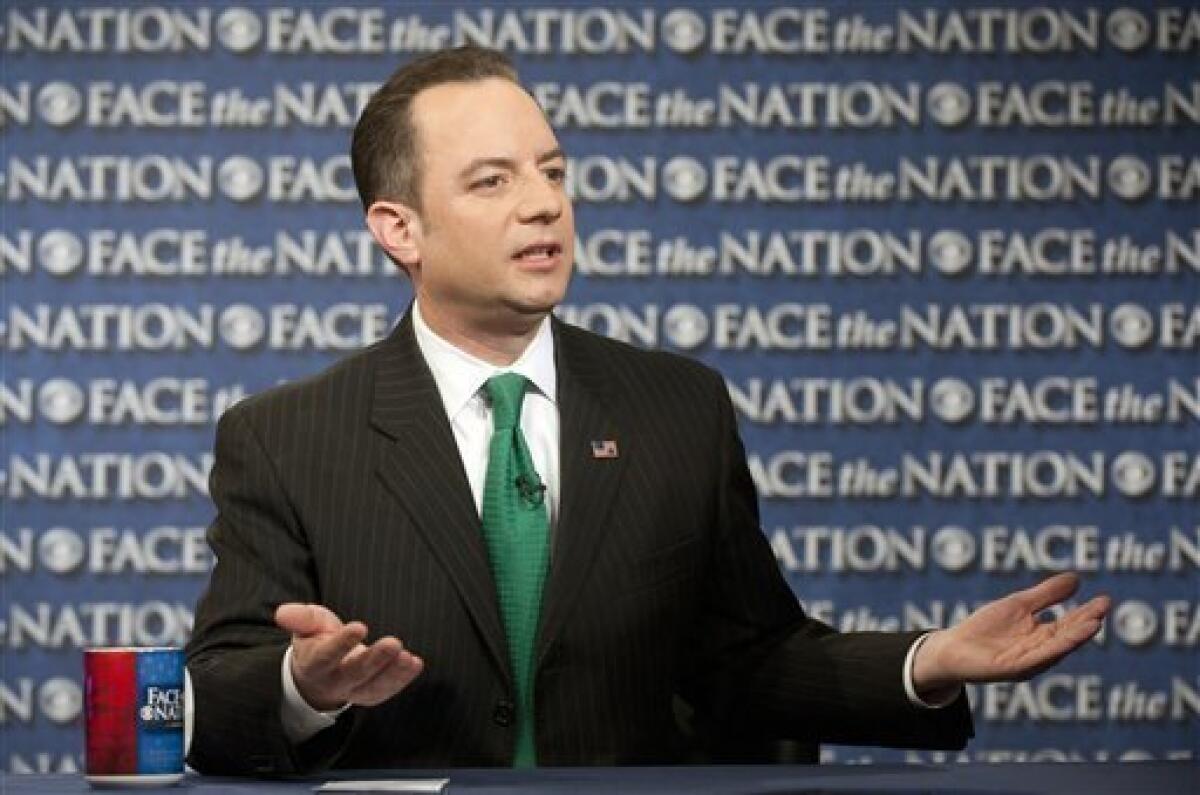GOP study calls for changes to halt presidential losing streak

- Share via
WASHINGTON -- A smug, uncaring, ideologically rigid national Republican Party is turning off the majority of American voters, with stale policies that have changed little in 30 years and an image that alienates minorities and the young, according to an internal GOP study.
That blunt assessment on the state of Republicanism at the national level comes from a major new report, out Monday, that will likely shake up an already battered party. It was commissioned by the head of the Republican National Committee in the wake of Mitt Romney’s defeat last year.
Without offering detailed policy prescriptions, the 98-page report calls on the party to “smartly change course,” modernize itself and develop “a more welcoming brand of conservatism that invites and inspires new people to visit us.”
There are extensive lists of proposals, many of them technological and procedural, designed to help the GOP better engage voters, especially women, minorities and the young, and reverse a losing pattern in five of the last six popular votes for president.
“Unless changes are made, it will be increasingly difficult for Republicans to win another presidential election in the near future,” the report concludes.
RNC Chairman Reince Priebus, in remarks in Washington on the release of the study by the party’s “Growth and Opportunity Project,” is unsparing in his analysis of the 2012 election setback.
“Our message was weak. Our ground game was insufficient. We weren’t inclusive. We were behind in both data and digital. Our primary and debate process needed improvement,” he says, according to an advance text of his remarks.
“We know we have problems. We’ve identified them, and we’re implementing the solutions to fix them,” he says.
Most of the criticisms are familiar to those, both inside and outside the GOP, who have watched the party fail to come to grips with changing demographics and, instead, try to rely on older, white voters who represent a shrinking part of the electorate.
“Young voters are increasingly rolling their eyes at what the party represents, and many minorities wrongly think that Republicans do not like them or want them in the country. When someone rolls their eyes at us, they are not likely to open their ears to us,” the report says. Young voters, it says, see the party as “old and detached from pop culture.”
In calling for the GOP to develop “a more welcoming conservatism,” the report rebukes those who remain in denial about the seriousness of the problem and those who are unwilling to broaden the party’s appeal.
A just-concluded gathering of conservatives in Washington cheered speaker after speaker who urged the GOP to stick to its guns and, instead, largely blamed the 2012 defeat on Romney or the way he ran his campaign.
“The Republican Party needs to stop talking to itself,” the study says. “We have become expert in how to provide ideological reinforcement to like-minded people, but devastatingly we have lost the ability to be persuasive with, or welcoming to, those who do not agree with us on every issue.”
The report calls on Republicans to counter the party’s image as an arm of business. It says Republicans should “blow the whistle at corporate malfeasance and attack corporate welfare. We should speak out when a company liquidates itself and its executives receive bonuses but rank-and-file workers are left unemployed. We should speak out when CEOs receive tens of millions of dollars in retirement packages but middle-class workers have not had a meaningful raise in years.”
Beyond that, however, there are no policy details. Indeed, the authors point out that they are not a policy committee, in a section calling on the GOP to “embrace and champion” comprehensive immigration reform without further specifics.
In addition, an extensive set of “inclusion” proposals for minority groups, including Latinos, Asians and African Americans, appears to mimic similar, failed outreach efforts by various RNC chairs over the last 30 years.
The report notes the party’s problems with women voters, especially unmarried women. But its 10-point plan for appealing to women makes no mention of the GOP stance on any social issues, such as abortion and same-sex marriage, that have turned off many of the voters in question.
In a section on campaign mechanics, Republicans are advised to make “a critical cultural shift” on early, absentee, and online voting, trends that the report notes are “here to stay.” The report fails to note, however, that Republican elected officials fought to block and even reverse that trend at the state level in 2012.
Although the RNC study spares Romney any direct criticism, it includes tacit criticism of GOP polling that seems directed at his campaign. Research conducted for the study report found that 70% of Republican pollsters surveyed said that Democratic polling in 2012 “was better than our own. Fully 22% felt the Democrats did ‘much better’ than the Republicans when it came to accuracy and reliability.”
In a section on party primaries, there are thinly veiled attacks on efforts by outside groups, such as those tied to former George W. Bush strategist Karl Rove and organizations like the Club for Growth, that seek to apply litmus tests or weed out candidates considered unelectable.
“It would be a mistake for any one organization to think it can circumvent GOP voters and hand-pick our nominees,” the report says. “Third-party groups that promote purity are hurting our electoral prospects.”
There are also calls for fewer candidate debates during the presidential primaries, a shorter nomination calendar and an earlier national convention.
The report is the product of a committee headed by Priebus’ allies and supporters, including Henry Barbour of Mississippi, the nephew of former governor and RNC chairman Haley Barbour; former George W. Bush White House spokesman Ari Fleischer; and Sally Bradshaw, a longtime advisor to former Florida Gov. Jeb Bush.
Twitter: @paulwestdc
More to Read
Get the L.A. Times Politics newsletter
Deeply reported insights into legislation, politics and policy from Sacramento, Washington and beyond. In your inbox three times per week.
You may occasionally receive promotional content from the Los Angeles Times.










